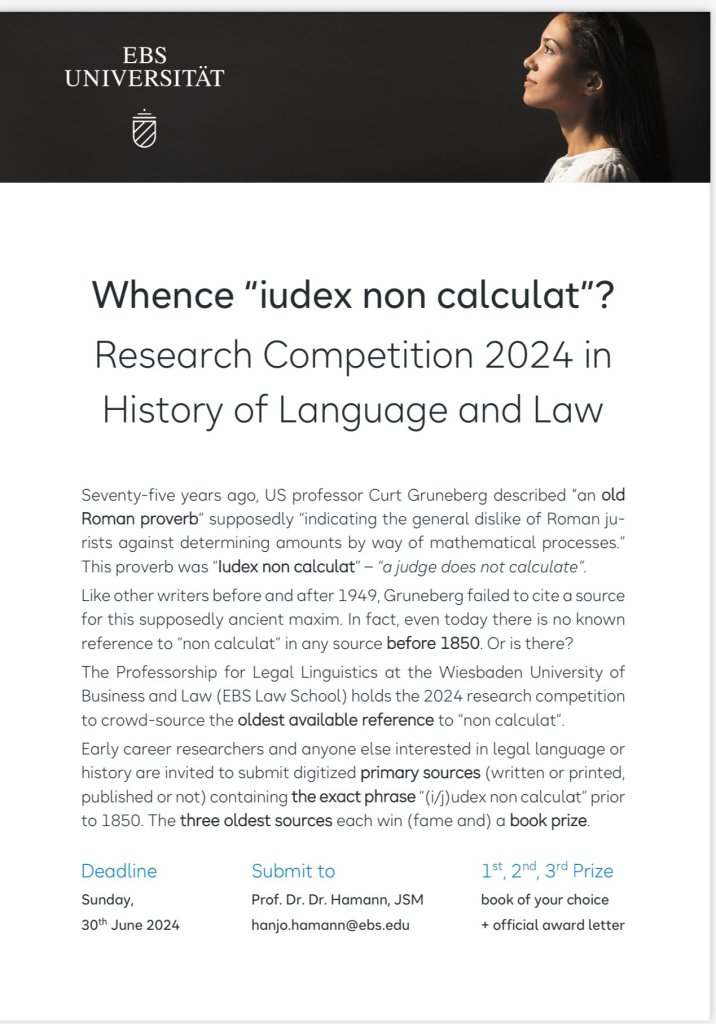
Teachers surely encounter calculating students in secondary schools, maybe even university students or exceptionally in primary education. Today I saw the announcement of a serious question about a lawyer who is not supposed to calculate. The adagium iudex non calculat, a judge does not calculate, sounds familiar, but what is its earliest source? Is it indeed already known in classical Roman law? Hanjo Hamann of the Law School of the European Business School (EBS) in Wiesbaden challenges you to find the earliest possible reference to this proverb. The Centre for Legal History at Edinburgh alerted on X/Twitter (@CentreLegalHist) to this interesting question,
Even if the proverb sounds familiar, I did not encounter the EBS until now. Their Research Competition 2024 in History of Language and Law might be also a kind of publicity event, but the connection sought with Roman law is a serious matter. The question takes its lead from an assertion made in 1949 by Curt Gruneberg. As the announcement – given in a poster version below my text – does not contain the title of his publication I did look a bit into this matter. In August 2023 Hamann uploaded a paper to SSRN, ‘”iudex non calculat”: A Scavenger Hunt in Legal History’ with in the second footnote the reference “Curt Gruneberg, Book Review, 18 U. KAN. CITY L. REV. 96 (1949)”. The 2023 article is the fruit of a workshop at Harvard University on calculation in law. Hamann gives you statistics for modern legal citations of the proverb, and he discussed its use in modern German law, the views of legal historians such as Detlev Liebs, Theo Mayer-Maly and Uwe Wesel, and he traced references in German scholarly literature to it as early as 1851. The competition challenges you to find earlier references to this proverb published in or before 1850. Hamann writes in particular also about the meaning given to this maxim, and this gives you certainly food for thought.
Tracing the original article of Gruneberg in an open access digital repository is perhaps another question. Gruneberg taught economics in Kansas City. His death aged 54 on January 14, 1950 is mentioned in the Kansas City Star of January 16, 1950. I will give full credits to you if you can procure his article from a non-licensed digital resource!
I distinctly remember a matter in legal history which came into view a few years ago with a similar quest for the earliest possible printed reference. In fact while preparing this brief post I was tempted to check at least one large digital library in my country for the new challenge set by Hamann, as for now without any valid result. I had best give you here his mail address, hanjo.hamann@ebs.edu, and the deadline of the competition, June 30, 2024. The three best submissions will receive a book prize. Hopefully both students of legal history and other legal historians will contribute to this quest!
The EBS announcement


Iudex non calculat is said to originate with Macer (2 de App.), D. 49.8.1.1, where a judge’s numerical error in calculating a verdict can be mechanically corrected without resort to a formal appeal. The rule is discussed by Sergio Alessandri, Aemilius Macer (2020) 129-130. BWF
Thanks, Bruce, for your comment! Hamann mentions D. 49.8.1.1, but not the study by Alessandrin on the Roman lawyer Macer.